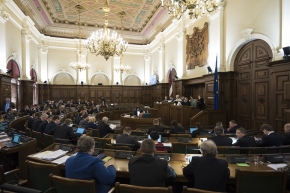 Galerie
Galerie
On Thursday, 21 April, the Saeima in the second and final reading adopted urgent amendments to the Criminal Law, clarifying and improving the first draft of the amendments which stipulate new regulations regarding crimes against the state. The amendments have been drafted with the aim of bringing the relevant section of the Law up-to-date and providing means to address threats to Latvia’s security posed by hybrid warfare, by establishing measures of criminal justice to respond in a timely manner to possible threats on the fundamental interests of the state.
“In light of public concern, as well as the State President’s indications that the initial draft of the amendments may be interpreted too broadly, the Legal Affairs Committee together with a wide range of experts has carefully reviewed the proposed amendments to ensure that criminal liability is unequivocally applied in cases when an individual has made an anti-constitutional attempt against the state. I would like to emphasise that discussions about expanding the authority of the State President or reducing the number of parliament members will not be interpreted as criminal violations,” said Gaidis Bērziņš, Chair of the Legal Affairs Committee of the Saeima, which was the committee responsible for drafting the amendments.
The Chair of the Legal Affairs Committee also pointed out that a decision was made to temporarily exclude penalties for illegally accessing state secrets from the current wording of the amendments. “We need this provision. However, the MPs decided to include it in a separate legislative proposal to be elaborated in line with bench practices of the European Court of Human Rights regarding cases involving freedom of the press and state secrets. We plan to have a debate on the issue in the Saeima in the coming weeks. We will also ask the working group established by the Ministry of Justice to prepare the next amendments together with experts of the field,” said Gaidis Bērziņš.
The current wording of the amendments, approved by the Legal Affairs Committee of the Saeima, provides penalties for actions undermining the independence, sovereignty, territorial integrity and government of the Republic of Latvia, i.e. actions which violate the constitution of our country. Penalties include incarceration for up to eight years, with a probation period of up to three years. Aggravating factors such as use of violence to commit such crimes or crimes committed by organised criminal groups will affect the sentencing and entail harsher punishment.
The Legal Affairs Committee also improved the provisions regarding criminal prosecution of individuals inciting subversion of state power. Any incitements or attempts to disseminate information against the independence, sovereignty, territorial integrity and government of the Republic of Latvia, i.e. actions which violate the constitution of our country, will now be penalised. Penalties include imprisonment for up to five years, temporary detention or alternative punishment.
The Legal Affairs Committee has also reviewed in the second reading the provisions regarding punishment of collaborators assisting other countries in their attempts to subvert the state power of the Republic of Latvia. Actions aimed at helping other countries or their citizens to undermine the independence, sovereignty, territorial integrity and government, public administration or national security of the Republic of Latvia will be punished with imprisonment for up to five years, temporary detention or alternative punishment.
The Legal Affairs Committee has also reviewed in the second reading the provisions regarding spying. The amendments now provide penalties for illegally accessing, as well as attempting or successfully transferring confidential data to other countries or their organisations either directly or through intermediaries. These provisions also cover cases when such data is collected or handed over to intelligence services of other countries either directly or through other agents of such services. Penalties for such actions, however, will remain as before: incarceration for up to ten years, with up to three years of probation.
The amendments were submitted for parliamentary consideration after being revised by the Legal Affairs Committee and the National Security Committee.
Solvita Āboltiņa, Chairperson of the National Security Committee, previously explained that the security situation worldwide and especially in Europe has changed considerably lately, and Latvia must be able to respond to new types of threats. However, the provisions of the Criminal Law on the responsibility for crimes against independence, territorial integrity, constitutional order and the rule of law have remained unchanged since the Law came into force in 1999, which means that the current regulatory framework can no longer ensure complete protection of Latvia’s national security interests.
Representatives of national security agencies have also pointed out that the current regulatory framework has several loopholes and the amendments need to be adopted as soon as possible. According to the summary of the proposed amendments, instead of direct military operations, nowadays new approaches are utilised to affect developments in other countries with the goal of overtaking control there. These methods are regarded as hybrid warfare and information warfare and may include both violent and non-violent, as well as open or concealed offences against the fundamental interests of a country.
The amendments to the Criminal Law were drafted in collaboration between the Constitution Protection Bureau; Defence Intelligence and Security Service; Security Police; Ministry of Justice; Prosecutor General’s Office; Supreme Court; Riga District Court; Ministry of the Interior; State Police; Chair of Criminal Law, Faculty of Law, University of Latvia; Latvian Council of Sworn Attorneys; and the Centre for Public Policy PROVIDUS.
Saeima Press Service







